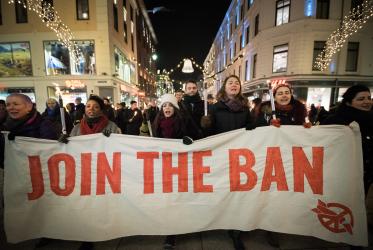Governments’ foreign policies need to change to focus on issues such as global inequalities that drive conflicts in many parts of the world, the moderator of the World Council of Churches (WCC) Central Committee, Agnes Abuom, said at a forum in Berlin with German foreign minister Sigmar Gabriel.
“We want foreign policy to rethink and stop an economy that looks at people as commodities,” said Abuom, a Kenyan Anglican, speaking at the 26 May forum on “Taking greater responsibility for peace: German foreign policy in times of upheaval,” organized as part of the German Protestant Kirchentag, or “church festival.”
Taking place every two years in a different German city, the Kirchentag this year has gathered more than 100,000 participants of all ages in Berlin from 24 to 28 May.
Abuom noted that nation states had recently committed themselves to the United Nations Sustainable Development Goals. Yet, “the military expenditure is far above the percentage allocated to health, to education,” said Abuom. “What a contradiction - you give with one hand and you take away with both hands.”
“We share a common planet, yet on this planet resources are manipulated and appropriated by only 1 percent of the entire globe at the expense of 99 percent,” said Abuom.
In his statements to the forum, foreign minister Gabriel criticized calls for Germany to raise military spending to 2 percent of gross domestic product, and warned against the “total dominance” of military perspectives in security policy.
The world is facing a “massive armaments spiral,” he warned. “There will be no stability and no peace only through military means, but instead we need development assistance, and crisis prevention,” said Gabriel, who became Germany’s foreign minister in January.
“The main problem is that no one is talking about it, except at the Kirchentag,” he said. “Help us to have a public debate about disarmament, arms control, to avoid us falling back into the times when all that was discussed was increasing armaments,” Gabriel challenged the more than participants attending the forum.
In her comments, Abuom described Germany’s contribution for peace as developing “a credible peace policy that genuinely tackles root causes of violence and one that engages all nations and all states irrespective of their economy, military and strategic position. “
Speaking of the experience of the WCC’s journey of justice and peace, she underlined the need for civil society, the private sector and non-state actors need to be involved in peacemaking and peace building. “We would like to promote peace building from the grass roots, from below,” she said, and to focus on “peace with justice,” and not just security.
“It is important to look at the promotion of a culture of dialogue and nonviolence, and not a culture of might and strength; not a culture that hides behind the walls that separate human beings,” Abuom continued. “We want a culture that breaks down the walls of separation.”
Participants at the forum overwhelmingly passed a resolution calling on Germany to join United Nations negotiations on a global ban of nuclear weapons, and to reject the storage of nuclear weapons on German soil.
The WCC’s humanitarian disarmament consultant, Jonathan Frerichs, who has been coordinating activities in support of a UN ban on nuclear weapons, noted that at the Kirchentag, “both Barack Obama and Angela Merkel spoke of the need for nuclear disarmament; it is up to us, with our faith and from our duty as Christians, to work to rid the world of nuclear weapons.”
More information on the Pilgrimage of Justice and Peace: www.oikoumene.org/pilgrimage
Read also: German Protestant Kirchentag opens to call for renewal of global order (WCC press release of 25 May 2017)








